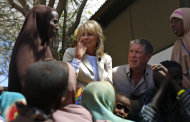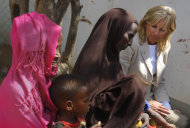DADAAB, Kenya (AP) — Hundreds of thousands of Somali children could die in East Africa's famine unless more help arrives, a top U.S. official warned Monday in the starkest death toll prediction yet. To highlight the crisis, the wife of Vice President Joe Biden visited a refugee camp filed with hungry Somalis.
Jill Biden is the highest-profile U.S. visitor to East Africa since the number of refugees coming across the Somali border dramatically increased in July. Biden, who traveled to the camp in a C-130 military transport plane, said she wants to raise awareness and persuade donors to give more.
"One of the reasons to be here is just to ask Americans and people worldwide, the global community, the human family, if they could just reach a little deeper into their pockets and give money to help these poor people, these poor mothers and children," said Biden, who met with two Somali mothers and their eight children.Later Monday in Washington, President Barack Obama approved $105 million for humanitarian efforts in the Horn of Africa to combat worsening drought and famine
"There is hope if people start to pay attention to this," said Biden, who also met with Kenyan President Mwai Kibaki and Prime Minister Raila Odinga.
A drought has turned into famine because little aid can reach militant-controlled south-central Somalia, forcing tens of thousands of Somalis who have exhausted all the region's food to walk to camps in Kenya, Ethiopia and the Somali capital of Mogadishu.
USAID administrator Raj Shah, who accompanied Biden, said hundreds of thousands of children could die from the famine. Shah said the world has a unique opportunity to save tens of thousands of children's lives by expanding humanitarian activities inside Somalia, though he noted that it would be a challenge for aid providers to get into al-Shabab-controlled south-central Somalia.
Given the camp's proximity to the uncontrolled and sometimes dangerous Somali border, a well-armed security team, some carrying sniper rifles, had secured the camp where she visited.More than 29,000 children under the age of 5 have died in the last 90 days in southern Somalia alone, according to U.S. estimates. The U.N. says 640,000 Somali children are acutely malnourished, suggesting the death toll of small children will rise.
The famine, Shah said, is the result of the a drought being superimposed on an environment where the government could not protect its own people.
More than 12 million people in the Horn of Africa are in need of immediate food aid, including nearly half of Somalia's population.
Aid is only reaching about 20 percent of the 2.6 million Somalis who need it, Mark Bowden, the U.N.'s top humanitarian official for Somalia, said on a visit to Mogadishu on Monday. The situation is better in the Somali capital, where about half the city's 600,000 inhabitants are receiving aid, he said. Still, camps in Mogadishu for displaced people are among the five declared famine zones in Somalia.
Transport and security are the two main problems, he said, and it is unclear what the effect will be of the withdrawal of Islamist insurgents from their bases in the capital on Saturday. The city is awash in gunmen and there have been several shootouts at aid distributions recently. At least 10 people have been killed.
"An absence of conflict does not mean that there is security here," he said. "There's always been factions and militias."A senior U.S. official traveling with Biden said the U.S. believes it is too early to tell what al-Shabab's intentions are, but that the reported withdrawal could be a sign that more aid could soon reach those in need.
Former Senate majority leader Bill Frist, who also joined Biden on her trip, said that even though Americans are focused on domestic financial troubles, Americans still will dedicate money to worthwhile international programs like health issues. Frist, a medical doctor, noted that measles outbreaks are being seen in Somali camps, but that such outbreaks can be controlled through modern medicine.
In other developments, the U.N. refugee agency on Monday flew 31 metric tons of shelter materials into Mogadishu, the first UNHCR aid flight into Somalia's capital in five years. A spokesman, Andrej Mahecic, said more flights will follow in coming days because aid deliveries by land and sea were too slow to cope with the dramatic influx of famine refugees to Mogadishu.
UNHCR says some 100,000 people have fled to the capital in the past two months.
In violence just outside Mogadishu, two witnesses told The Associated Press that a militant car bomb exploded prematurely, killing the driver of the vehicle.
Lt. Col. Paddy Ankunda, the spokesman for the African Union force in Mogadishu, attributed the premature blast to al-Shabab losing many of its more competent bomb-makers to fighting that raged in Mogadishu all year. Ankunda said there have been five premature detonations this year from militant bombs.



No comments:
Post a Comment